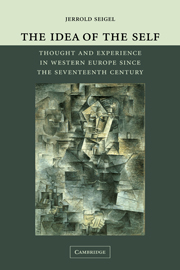Book contents
- Frontmatter
- Contents
- Acknowledgments
- PART I INTRODUCTORY
- PART II BRITISH MODERNITY
- PART III SOCIETY AND SELF-KNOWLEDGE: FRANCE FROM OLD REGIME TO RESTORATION
- PART IV THE WORLD AND THE SELF IN GERMAN IDEALISM
- PART V MODERN VISIONS AND ILLUSIONS
- 13 Dejection, insight, and self-making: Coleridge and Mill
- 14 From cultivated subjectivity to the culte du moi: polarities of self-formation in nineteenth-century France
- 15 Society and selfhood reconciled: Janet, Fouillé, and Bergson
- 16 Will, reflection, and self-overcoming: Schopenhauer and Nietzsche
- 17 Being and transcendence: Heidegger
- 18 Deaths and transfigurations of the self: Foucault and Derrida
- 19 Epilogue
- Notes
- Index
14 - From cultivated subjectivity to the culte du moi: polarities of self-formation in nineteenth-century France
Published online by Cambridge University Press: 05 June 2012
- Frontmatter
- Contents
- Acknowledgments
- PART I INTRODUCTORY
- PART II BRITISH MODERNITY
- PART III SOCIETY AND SELF-KNOWLEDGE: FRANCE FROM OLD REGIME TO RESTORATION
- PART IV THE WORLD AND THE SELF IN GERMAN IDEALISM
- PART V MODERN VISIONS AND ILLUSIONS
- 13 Dejection, insight, and self-making: Coleridge and Mill
- 14 From cultivated subjectivity to the culte du moi: polarities of self-formation in nineteenth-century France
- 15 Society and selfhood reconciled: Janet, Fouillé, and Bergson
- 16 Will, reflection, and self-overcoming: Schopenhauer and Nietzsche
- 17 Being and transcendence: Heidegger
- 18 Deaths and transfigurations of the self: Foucault and Derrida
- 19 Epilogue
- Notes
- Index
Summary
In France no less than elsewhere in Europe, people experienced the nineteenth century in terms of a rising individualism, as old solidarities weakened in the face of political and economic changes. Tocqueville, writing of America but with his eye on his own country, noted that “individualism” was “a word recently coined to express a new idea.” Earlier generations had known only “egoism,” the “passionate and exaggerated love of self.” But individualism was “a calm and considered feeling which disposes each citizen to isolate himself from the mass of his fellows and withdraw into the circle of family and friends,” leaving the larger society “to look after itself.” Tocqueville thought this a universal phenomenon, and so it was, corresponding to the increasing mobility of nineteenth-century people, both geographical and social, which cut large numbers off from their places of origin and required them to operate inside larger and more anonymous settings: burgeoning cities, expanding and bureaucratized states, mechanized workplaces, specialized occupations, organized political parties. Over time these frames of social experience replaced the more personal and immediate institutions and hierarchies of the Old Regime, leading many observers to speak of a mass society that swallowed up individuality in the very conditions that set it free from tradition and local provincialism. The terms in which these phenomena were diagnosed by critics, Durkheim's anomie, Nietzsche's nihilism, Heidegger's loss of authentic being, have continued to resonate into our own time.
- Type
- Chapter
- Information
- The Idea of the SelfThought and Experience in Western Europe since the Seventeenth Century, pp. 469 - 507Publisher: Cambridge University PressPrint publication year: 2005

